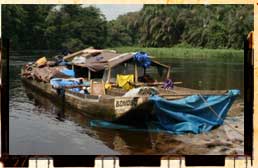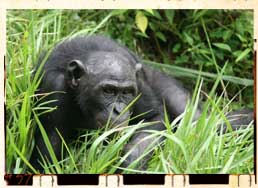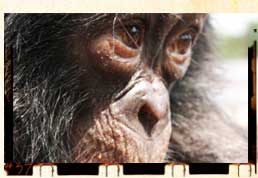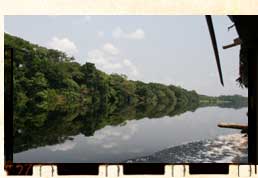We also have on board a couple of cooks, two assistant helmsmen, and a young stow away who leaps into the baggage area just as we push off. When confronted and pressed to leave he audaciously produces a tattered student card as incontrovertible proof of his entitlement to join our journey. Suitably taken aback by this youthful brazenness, we agree to let him stay on. After all, we decide, we'd each of us in younger times flashed a student card for all sorts of dubious purposes.
We set off at dusk from the bustling river port of Mbandaka. Our three pirogues, better described as hollowed-out logs, are lashed together and bound with vine and frayed rope. We are punting against the flow of the mighty Congo River -- the most voluminous river in the world after the Amazon -- and known locally as "the river that swallows all rivers". In places the river is so wide that one bank is not visible from the other. The outboards drone like a swarm of wild bees as they strain against the current, and start propelling our foray slowly but persistently into the oceanic depths. Their humming envelopes our movement and cocoons us -- as if in a sound capsule -- from the immensity of the forest that wades and plunges an escarpment of foliage along the river's edge. As we motor continuously for 7 days and nights I feel a notion of piercing into the heart of nature. Our pace, no faster than a light jog, seems entirely appropriate for such a journey -- any faster would be too much of a rude incursion into the timelessness of this wild expanse.
The movement of the boat through the haze of heat and draping humidity creates some cool relief. We have visitors to our vessel, some welcome, some not so. Drifts of butterflies, in a kaleidoscope of electric blues and greens, or flutters of butter gold, pay haphazard visits to our unlikely presence. I wonder whether the ubiquitous sand flies have enough stamina to keep up with our patient probing up river. I spot some of the little blighters coasting on the cushion of air in front of the pirogues, like dolphins in the bow wave of a tanker, and coat my legs and arms in a sheen of RID. Horse flies the size of cicadas buzz and dive-bomb us like messerschmitts. We each have a sleeping mat under the tarpaulin rig, and keeping our respective spaces free of biting or stinging critters takes vigilance. I notice that Phil has acquired an accomplice in his quest for a bug free zone. A large praying mantis has taken lodgings in the exterior folds of his mozzie net, and has already chomped a few march flies.
We are the first westerners in a long time to journey this stretch of river, and we must seem an apparition to many of the fishing villagers. We receive a mixture of responses, most friendly and some baffled, as well as a few angry gesticulations clearly telling us to get the hell away. From notches at the foot of the tumbling crags of dense jungle -- almost imperceptible nooks and crannies in the great walls that flank our every day -- we see a sporadic gleam of smiling teeth and a palm raised in friendly wave with a welcoming cry of "Mboti". Luke has taken to giving a military salute to these friendly faces, and chuckles heartily at the mimicked salutes he receives in reply. It gives our little bustle upstream an air of bumbling mercenaries on a not so covert mission.










